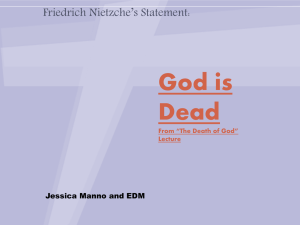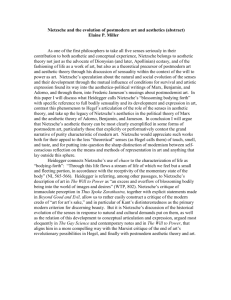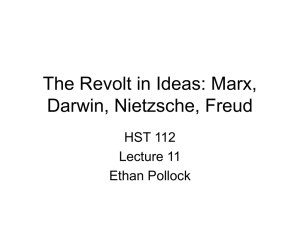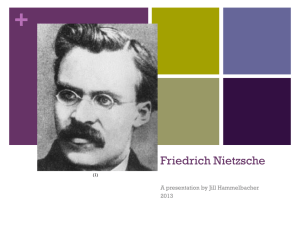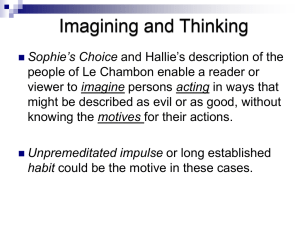The Philosophy of Nietzsche
advertisement
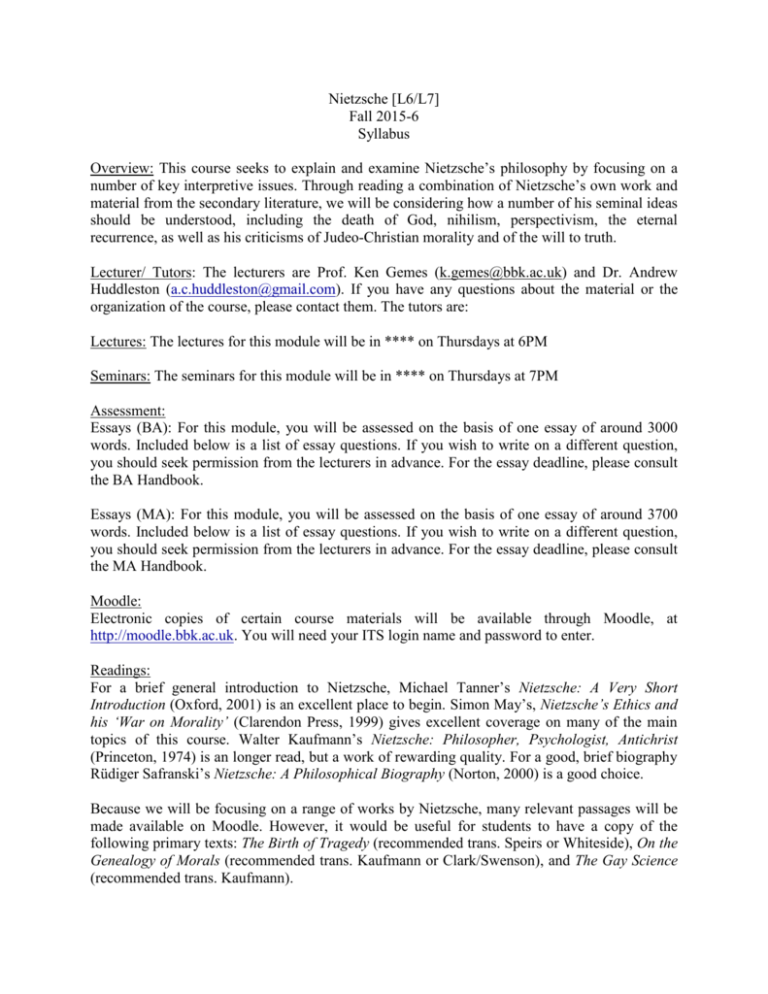
Nietzsche [L6/L7] Fall 2015-6 Syllabus Overview: This course seeks to explain and examine Nietzsche’s philosophy by focusing on a number of key interpretive issues. Through reading a combination of Nietzsche’s own work and material from the secondary literature, we will be considering how a number of his seminal ideas should be understood, including the death of God, nihilism, perspectivism, the eternal recurrence, as well as his criticisms of Judeo-Christian morality and of the will to truth. Lecturer/ Tutors: The lecturers are Prof. Ken Gemes (k.gemes@bbk.ac.uk) and Dr. Andrew Huddleston (a.c.huddleston@gmail.com). If you have any questions about the material or the organization of the course, please contact them. The tutors are: Lectures: The lectures for this module will be in **** on Thursdays at 6PM Seminars: The seminars for this module will be in **** on Thursdays at 7PM Assessment: Essays (BA): For this module, you will be assessed on the basis of one essay of around 3000 words. Included below is a list of essay questions. If you wish to write on a different question, you should seek permission from the lecturers in advance. For the essay deadline, please consult the BA Handbook. Essays (MA): For this module, you will be assessed on the basis of one essay of around 3700 words. Included below is a list of essay questions. If you wish to write on a different question, you should seek permission from the lecturers in advance. For the essay deadline, please consult the MA Handbook. Moodle: Electronic copies of certain course materials will be available through Moodle, at http://moodle.bbk.ac.uk. You will need your ITS login name and password to enter. Readings: For a brief general introduction to Nietzsche, Michael Tanner’s Nietzsche: A Very Short Introduction (Oxford, 2001) is an excellent place to begin. Simon May’s, Nietzsche’s Ethics and his ‘War on Morality’ (Clarendon Press, 1999) gives excellent coverage on many of the main topics of this course. Walter Kaufmann’s Nietzsche: Philosopher, Psychologist, Antichrist (Princeton, 1974) is an longer read, but a work of rewarding quality. For a good, brief biography Rüdiger Safranski’s Nietzsche: A Philosophical Biography (Norton, 2000) is a good choice. Because we will be focusing on a range of works by Nietzsche, many relevant passages will be made available on Moodle. However, it would be useful for students to have a copy of the following primary texts: The Birth of Tragedy (recommended trans. Speirs or Whiteside), On the Genealogy of Morals (recommended trans. Kaufmann or Clark/Swenson), and The Gay Science (recommended trans. Kaufmann). Lecture and Seminar Topics with Readings N.B. the volumes cited (e.g. Young 2105) appear in the bibliography below Week 1: Death of God (KG) Nietzsche, F., Gay Science 125 Week 2: The Need for Myth (KG) Nietzsche, F., Birth of Tragedy, “Attempt at a Self-Criticism”, Sects. 1-15, 18, 23, 24 Gemes, K., and Sykes, C., “The Culture of Myth and the Myth of Culture” in Young 2015 Week 3: Culture and the Great Individual (AH) Selected passages on Moodle Young, J., Nietzsche’s Philosophy of Religion (Cambridge, 2006), “Introduction.” Clark, M., and Wonderly, M., “The Good of Community,” in Young 2015 Week 4: Genealogy (AH) Nietzsche, F., On the Genealogy of Morals, “Preface.” Geuss, R., “Nietzsche and Genealogy,” European Journal of Philosophy 2:3 (1994), 274-92. Week 5: Morality Critique (AH) Nietzsche, F., On the Genealogy of Morals, Essay I Geuss, R., “Nietzsche and Morality” in European Journal of Philosophy 5:1 (1997), 1-20. Week 6: Nihilism (KG) Will to Power, Preface, and Sec.’s 1-56 (including “Toward an Outline”) Gemes, K., “Nietzsche, Nihilism and the Paradox of Affirmation” Week 7: Value of Values (AH) Selected passages on Moodle Leiter, B., “Nietzsche’s Meta-Ethics: Against the Privilege Readings” in European Journal of Philosophy 8:3 (2000), 277-97. Huddleston, A., “Nietzsche’s Meta-Axiology: Against the Sceptical Readings” in British Journal for the History of Philosophy 22:2 (2014) 322-42. Week 8: Eternal Recurrence (AH) Selected passages on Moodle Nehamas, A., “The Eternal Recurrence,” Philosophical Review 89:3 (1980), 331-56 Clark, M., Nietzsche on Truth and Philosophy, Ch. 8 Week 9: Perspectivism and Will to Power (KG) Nietzsche, F., On the Genealogy of Morals II 6; III 7; III 12; BGE 36 Gemes, K., “Life’s Perspectives” in Week 10: Will to Truth and Ascetic Ideals (KG) Nietzsche, F., On the Genealogy of Morals III Gemes, K., ““We Remain of Necessity Stranger to Ourselves”: The Key Message of Nietzsche’s Geneology”, in Acampora 2006. Essay Questions: 1. What for Nietzsche is the meaning of “The Death of God”? 2. What is the importance of myth and/or illusion for Nietzsche? 3. What is the relationship between great individuals and great cultures? 4. To what extent is Nietzsche’s genealogy an exercise in history? 5. What is the basis for Nietzsche’s criticism of morality? 6. What is Nihilism? 7. Does Nietzsche regard his own evaluative outlook, in light of which he criticizes JudeoChristian morality, as having any privileged status? 8. Does Nietzsche offer the eternal recurrence as cosmological theory? If not, what role does it play in his philosophy? 9. What is Nietzsche’s perspectivism? 10. Does Nietzsche value truth? Selected Monographs on Nietzsche: Clark, M., 1990, Nietzsche on Truth and Philosophy, Cambridge University Press Janaway, C., 2007. Beyond Selflessness: Reading Nietzsche’s Genealogy, Oxford University Press Kaufmann, W., 1974.,Nietzsche: Philosopher, Psychologist, Antichrist, 4th edition, Princeton University Press Lieter, B., 2002, Nietzsche on Morality, Routledge May, S., 1999, Nietzsche’s Ethics and his ‘War on Morality’, Clarendon Press Nehamas, A., 1985, Nietzsche: Life as Literature, Harvard University Press Reginster, B., 2006. The Affirmation of Life: Nietzsche on Overcoming Nihilism, Harvard University Press Richardson, J., 1996, Nietzsche’s System, Oxford University Press Selected Anthologies on Nietzsche: Acompora, C., 2006, Nietzsche's On the Genealogy of Morals: Critical Essays. Lanham, MD: Rowman& Littlefield Publishers Came, D., 2014, Nietzsche on Art and Life, Oxford University Press Gemes, K., & Richardson J., 2013, The Oxford Handbook on Nietzsche, J. Richardson, Oxford University Press Gemes, K., & May, S., eds., 2009, Nietzsche on Freedom and Autonomy, Oxford University Press Leiter, B., and Sinhababu,N., eds., 2007, Nietzsche and Morality, Oxford University Press May, S., 2011, Nietzsche's On the Genealogy of Morality: A Critical Guide, Cambridge University Press Richardson, J. and Leiter B., eds., 2001, Nietzsche, Oxford University Press Schacht, R., 1994, Nietzsche, Genealogy, Morality: Essays on Nietzsche's "On the Genealogy of Morals”, University of California Press Young, J., ed., 2015, Individual and Community in Nietzsche’s Philosophy, Cambridge University Press Selected Essays on Nietzsche Anderson, R., “On the Nobility of Nietzsche’s Priests” in May 2011 Anderson, R., “Nietzsche on Truth, Illusion, and Redemption,” European Journal of Philosophy 13:2, 185–225, 2005 Bittner, R., “Ressentiment” in Schacht 1994 Clark, Maudemarie, and David Dudrick, “Nietzsche and Moral Objectivity: The Development of Nietzsche’s Meta-ethics,” in Leiter and Sinhababu 2007 Forster, M., “Genealogy and Morality” American Dialectic 1:3, 346-69, 2011 Foucault, Michel, “Nietzsche, Genealogy, History,” in Richardson & Leiter 2001 Gemes, K., “Nietzsche’s Critique of Truth,” Philosophy & Phenomenological Research 52: 4765. Also reprinted in Richardson & Leiter 2001 Gemes, K., “Post-Modernism’s Use and Abuse of Nietzsche,” Philosophy and Phenomenological Research, 62:337-360.Geuss, R., “Culture as Ideal and as Boundary, in his Politics and the Imagination , Princeton, 2009 Han-Pile, B., “Nietzsche and Amor Fati,” European Journal of Philosophy 19:2, 224-261. Huddleston, A., “What is Enshrined in Morality? Understanding the Grounds for Nietzsche’s Critique,” Inquiry 58:3), 281-307, 2015 Hurka, T., “Nietzsche: Perfectionist” in. Leiter and Sinhababu 2007 Hussain, N., “Honest Illusion: Valuing for Nietzsche’s Free Spirits,” in Leiter and Sinhababu 2007 Hussain, N., “Nietzsche’s Meta-ethical Stance,” in Gemes and Richardson 2013 Leiter, Brian, “Moral Skepticism and Moral Disagreement in Nietzsche,” Oxford Studies in Metaethics, ed. Russ Shafer-Landau, Oxford, 2014 Loeb, P., “Identity and Eternal Recurrence” in A Companion to Nietzsche, ed. Keith AnsellPearson, Blackwell, 2006 Loeb, Paul, “Eternal Recurrence” in The. Gemes and Richardson Oxford, 2013 Kail, P., “‘Genealogy’ and the Genealogy” in May 2011. Wallace, “Ressentiment, Value, and Self-Vindication: Making Sense of the Slave Revolt,” in Leiter and Sinhababu 2007 Silk, Alex, “Nietzschean Constructivism” Inquiry 58:3, 2015 Soll, I., “Reflections on Recurrence: A Re-examination of Nietzsche’s Doctrine, die ewige Wiederkehr des Gleichen” in Nietzsche: A Collection of Critical Essays, ed. Robert Solomon, Notre Dame, 1973


